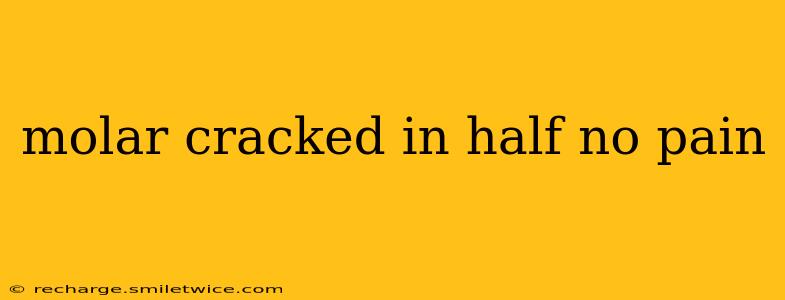Discovering a cracked molar can be alarming, even if it's not causing pain. While the absence of pain might seem reassuring, it's crucial to understand that a cracked tooth, even without immediate discomfort, requires prompt dental attention. Ignoring the issue can lead to significant complications down the line, including infection, further damage, and even tooth loss. This comprehensive guide explores the potential causes, complications, and treatment options for a cracked molar with no associated pain.
What Causes a Molar to Crack in Half?
Several factors can contribute to a cracked molar, even without causing immediate pain. These include:
- Bruxism (Teeth Grinding): Habitual teeth grinding, often unconscious, places immense pressure on teeth, leading to microscopic cracks that can eventually propagate.
- Dental Trauma: A blow to the mouth, even a seemingly minor one, can cause hairline fractures in teeth that may not be immediately apparent.
- Large Fillings: Extensive fillings, particularly old amalgam fillings, can weaken the tooth structure, making it more susceptible to cracking under stress.
- Decay: Untreated cavities weaken the tooth, making it more fragile and prone to fractures.
- Internal Tooth Defects: In some cases, internal structural weaknesses within the tooth itself can contribute to cracking.
Why Doesn't My Cracked Molar Hurt?
The absence of pain with a cracked molar is often due to the location and extent of the crack. If the crack doesn't reach the nerve (dental pulp), there will be no pain signal transmitted to the brain. However, this doesn't mean the problem isn't serious. The crack can still allow bacteria to enter, leading to infection and eventual pulp damage, at which point pain will likely develop.
What Happens if I Ignore a Cracked Molar?
Ignoring a cracked molar without pain can have several negative consequences:
- Infection: Bacteria can easily penetrate the crack, leading to an infection of the tooth's pulp (the soft tissue containing nerves and blood vessels). This can result in an abscess, a painful pus-filled pocket that can spread to other areas of the jaw.
- Tooth Loss: As the infection progresses, the tooth can become severely weakened and eventually fall out or require extraction.
- Increased Pain: Eventually, the crack may extend to the nerve, causing significant pain and discomfort. At this stage, treatment becomes more complex and potentially more costly.
How is a Cracked Molar Diagnosed?
Diagnosing a cracked molar can be challenging as it might not be immediately visible. Your dentist will likely use several methods:
- Visual Examination: A thorough visual inspection of the tooth.
- Bite Test: Applying pressure to the tooth to check for tenderness or pain.
- X-rays: Dental X-rays can reveal cracks not visible to the naked eye.
- Transillumination: Shining a bright light through the tooth to detect cracks.
What are the Treatment Options for a Cracked Molar?
Treatment for a cracked molar depends on the severity and location of the crack:
- Dental Bonding: For minor cracks, your dentist might be able to repair the tooth using dental bonding, a procedure that involves applying a composite resin to seal the crack.
- Crown: A dental crown is a cap that fits over the entire tooth, protecting it from further damage and restoring its shape and function. Crowns are commonly used for larger cracks.
- Root Canal Treatment: If the crack extends to the pulp, a root canal may be necessary to remove the infected tissue and seal the tooth. This is often followed by a crown.
- Extraction: In cases of severe damage or extensive infection, tooth extraction may unfortunately be the only option.
Can a Cracked Molar Heal on Its Own?
No, a cracked molar will not heal on its own. The crack will likely worsen over time, leading to further damage and complications. It's essential to seek professional dental care as soon as you suspect a problem.
How Much Does it Cost to Fix a Cracked Molar?
The cost of treating a cracked molar varies greatly depending on the severity of the damage and the treatment required. Factors such as the need for a root canal, crown, or extraction will significantly impact the overall cost. It is best to consult with your dentist for an accurate estimate.
What Should I Do if I Suspect a Cracked Molar?
If you suspect you have a cracked molar, even without pain, schedule an appointment with your dentist immediately. Early diagnosis and treatment significantly improve the chances of saving the tooth and preventing more extensive problems. Early intervention is key to a successful outcome and preventing further damage. Don't delay; your oral health is crucial!
